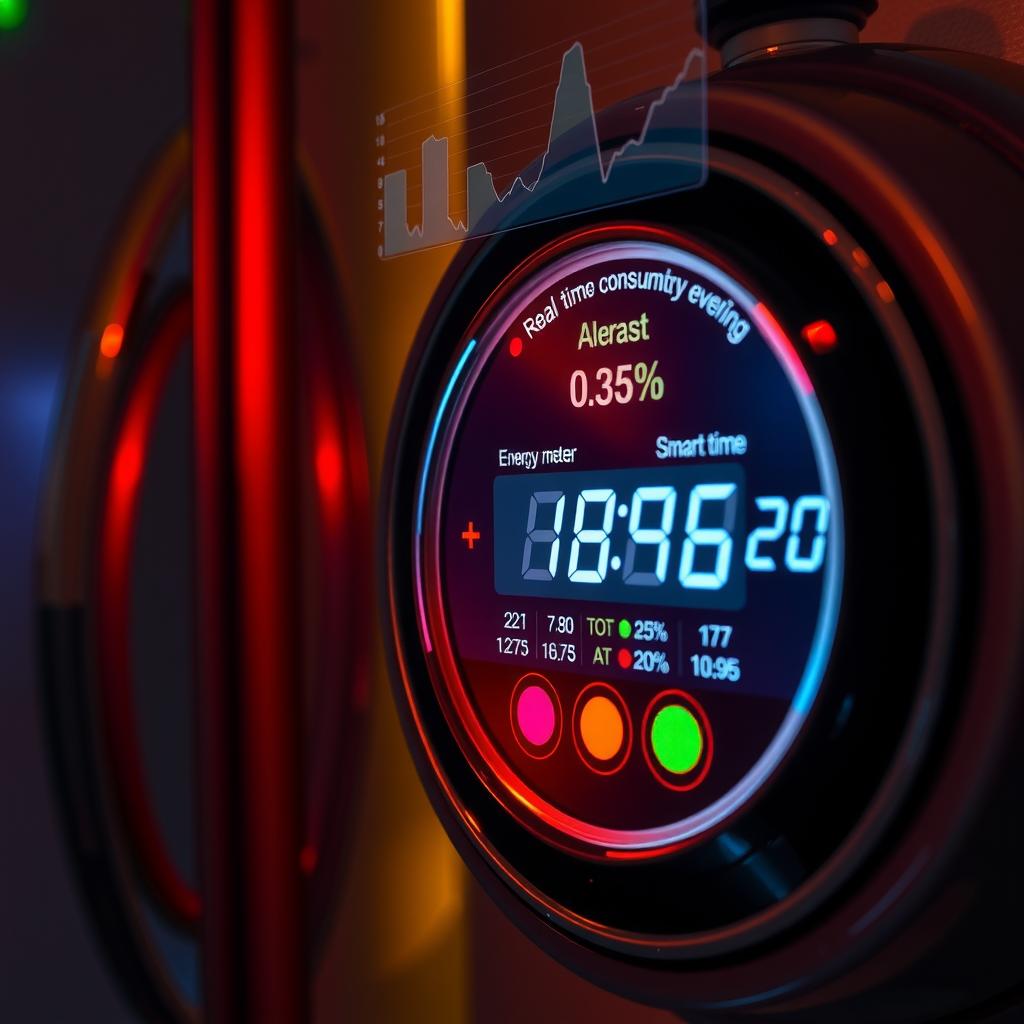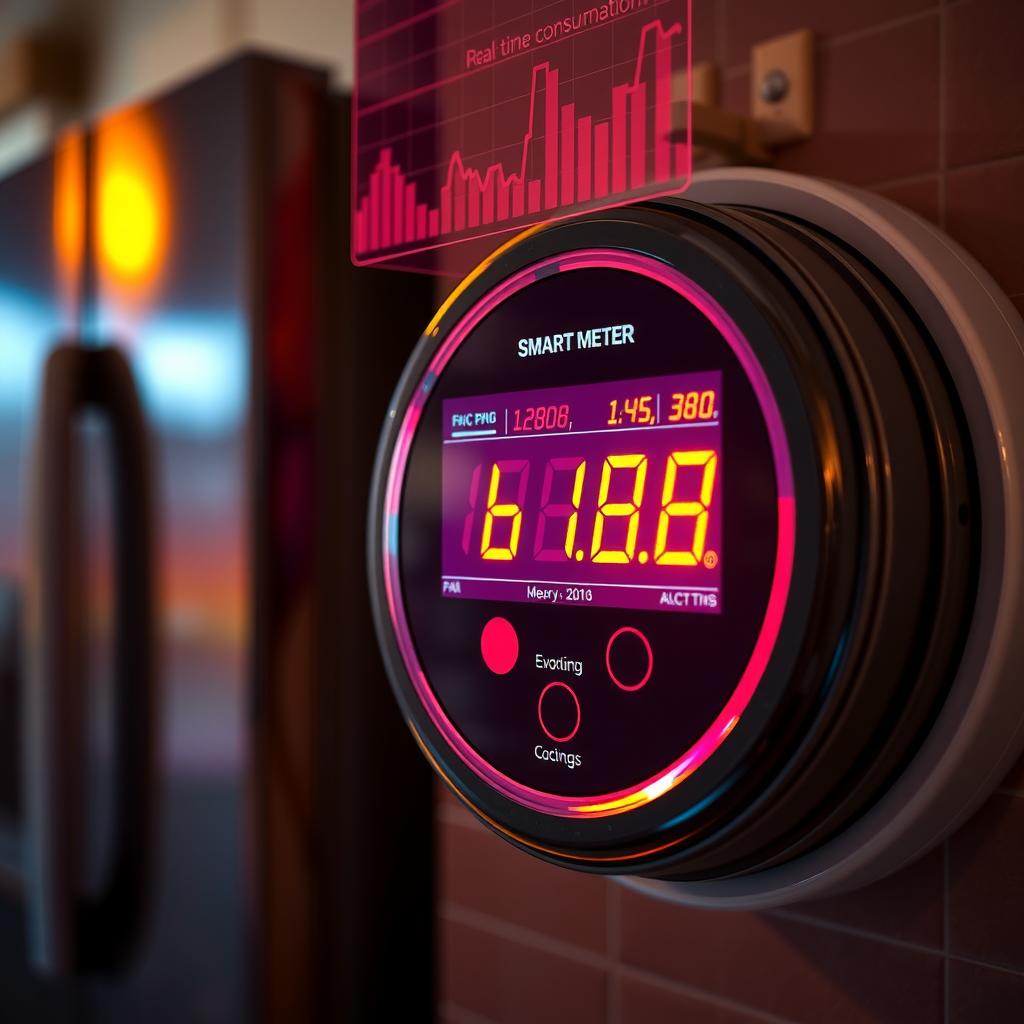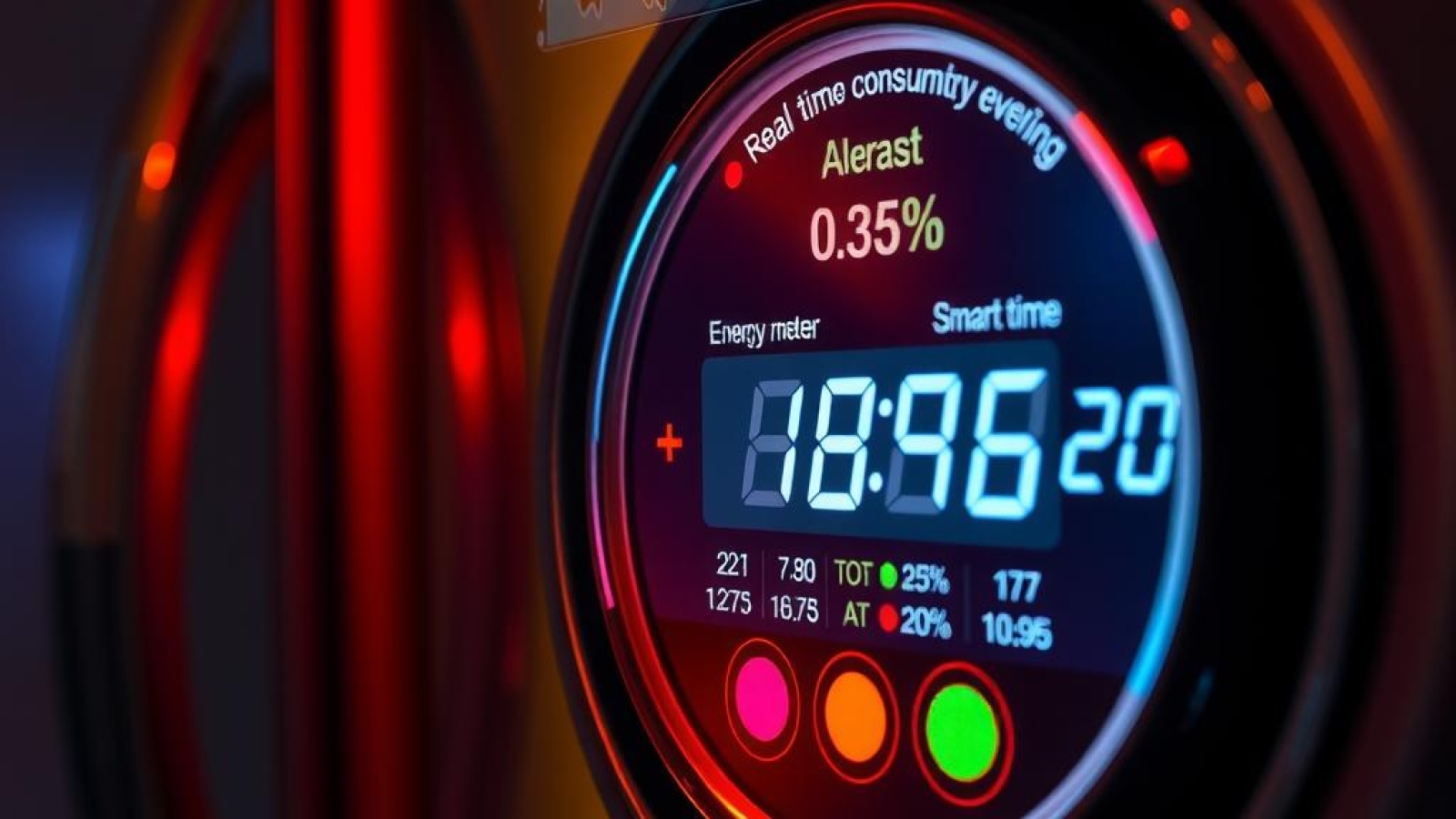In today’s fast-paced world, have you ever found yourself shocked by an unexpectedly high energy bill? This common phenomenon often leads individuals to wonder about their daily energy consumption habits and the ways in which they can take control of their usage. Enter the smart meter, a revolutionary tool in energy monitoring that provides real-time insights into how much energy is being consumed at any given moment. With the rise of technology-driven solutions, these devices are not just gadgets; they represent a significant leap towards efficient energy management.
The core value of implementing a smart meter lies in its ability to deliver immediate feedback through real-time alerts, enabling users to track their consumption patterns accurately. Imagine receiving instant notifications when your household’s energy use spikes unexpectedly—this feature allows for timely adjustments that could lead to considerable savings on monthly bills. By embracing this advanced technology, consumers can cultivate better habits around their home’s electricity use and significantly enhance overall efficiency improvements.
As consumers become more aware of their power usage, opportunities for cost savings emerge. A smart meter equips individuals with precise data that empowers them to make informed decisions about where they can cut back or optimize their expenditures on electricity. The integration of such devices not only aids personal finance but also contributes positively to broader sustainability goals by promoting reduced waste and smarter resource allocation.
The journey toward understanding one’s own energy consumption begins with recognizing the invaluable role of tracking tools like the smart meter. In this blog post, readers will discover how these innovative devices function beyond mere monitoring—they foster a proactive approach toward managing energy expenses through effective tracking and insightful alerts tailored specifically for individual needs. As we delve deeper into this topic, it becomes clear: adopting smart meters is not merely an option; it represents an essential step towards achieving greater awareness and control over one’s household or business energy footprint.
Stay tuned as we explore how leveraging these technologies transforms passive observation into active engagement with our daily power usage—an exciting shift poised to empower users in unprecedented ways!

Key Points:
- Empowering Users with Real-Time Insights: The introduction of the smart meter revolutionizes how individuals monitor their energy consumption. By providing instant notifications regarding spikes in usage, users are empowered to make timely adjustments that lead to better management of their electricity needs.
- Enhancing Efficiency through Consumption Tracking: With its advanced energy monitoring capabilities, the smart meter allows users to gain a deeper understanding of their energy footprint. This detailed analysis aids in identifying which appliances consume the most power, facilitating informed decisions that drive significant efficiency improvements and subsequent cost savings.
- Fostering Sustainable Practices via Usage Notifications: As sustainability becomes increasingly important, the role of technology like the smart meter is paramount. By delivering real-time alerts on consumption patterns, these devices encourage proactive measures among consumers and businesses alike, ultimately contributing positively towards environmental goals while maintaining economic viability through reduced utility costs.

Understanding Smart Meters: A Comprehensive Overview
The Technology Behind Real-Time Energy Monitoring
In today’s world, where energy efficiency and consumption awareness are paramount, the smart meter has emerged as an essential tool for both consumers and utility providers. This advanced technology allows for real-time monitoring of energy usage, providing users with instant insights into their consumption patterns. Unlike traditional meters that require manual readings and offer limited data, a smart meter utilizes digital technology to track energy consumption continuously and relay this information back to the energy provider through secure communication networks.
The functionality of a smart meter is rooted in its ability to provide detailed data on electricity usage at any given moment. By employing sensors and integrated software systems, these devices can measure how much power is being consumed by various appliances within a household or business. This capability not only aids consumers in understanding their daily habits but also empowers them to make informed decisions about their energy use. Through usage notifications sent directly from the smart meter, individuals can receive alerts regarding peak times when electricity demand surges, allowing them to adjust their habits accordingly—whether that means running dishwashers late at night or turning off lights during daylight hours.
Moreover, the implementation of a smart meter offers significant benefits beyond mere tracking; it serves as a platform for efficiency improvements and cost savings. With access to comprehensive historical data on one’s own energy consumption trends—as well as comparison tools offered by many utility companies—consumers can identify areas where they may be wasting power or could implement conservation strategies effectively. For instance, if a homeowner notices unusually high readings during certain times of day via their smart meter’s interface, they might investigate whether specific appliances are drawing excessive power or whether there are opportunities for upgrading older equipment with more efficient models.
Utility providers also gain valuable insights from smart meters that help optimize grid management. With real-time alerts about outages or irregularities in consumption patterns reported back immediately from individual units across vast regions, utilities can respond more swiftly than ever before—a factor critical during extreme weather events when timely action is necessary for public safety. Furthermore, aggregated data collected from numerous smart meters_ enables utility companies to forecast demand better and plan infrastructure improvements proactively rather than reactively.
In conclusion, understanding how smart meters function unlocks new possibilities in terms of monitoring energy use while fostering greater accountability among consumers regarding their contribution towards sustainability efforts over time. As society continues shifting toward smarter technologies aimed at reducing carbon footprints globally—it becomes increasingly clear that adopting devices like the smart meter will play an integral role not only in promoting responsible behavior but also shaping future standards across industries related directly with resource management.
The Power of Instant Notifications
Enhancing User Engagement for Energy Efficiency
Real-time alerts serve as a transformative tool in energy monitoring, empowering users to make informed decisions regarding their consumption. With the implementation of smart meters, individuals can receive instantaneous notifications about their energy usage patterns, allowing them to identify trends and anomalies that might otherwise go unnoticed. This immediate feedback loop fosters an environment where consumers are more aware of their energy consumption behaviors. As they receive real-time data on electricity use, users can adjust their habits accordingly—such as reducing power during peak hours or turning off devices when not in use—ultimately leading to significant cost savings over time. For instance, if a household receives a notification indicating unusually high energy usage due to an appliance left on inadvertently, they can take corrective action immediately rather than facing unexpected charges at the end of the billing cycle.
Improved Decision-Making Through Consumption Tracking
Leveraging Technology for Sustainable Choices
The integration of smart meters allows for enhanced tracking of energy consumption which plays a critical role in decision-making processes related to sustainability and efficiency improvements. By providing detailed insights into daily or hourly usage patterns through real-time alerts, these advanced systems enable users to pinpoint specific times when energy demand surges. Such information is invaluable; it encourages proactive measures like scheduling heavy-duty appliances during off-peak hours or making strategic investments in more efficient technologies. Moreover, continuous monitoring aids households and businesses alike in understanding how changes in behavior affect overall consumption levels—a vital aspect when aiming for reductions that align with environmental goals. Thus, not only do real-time alerts facilitate immediate operational adjustments but also contribute towards long-term shifts toward sustainable practices.
Cost Reductions Driven by Usage Notifications
Financial Benefits from Real-Time Insights
Receiving timely notifications about current energy usage via smart meters has profound implications on financial management within both residential and commercial settings. Users equipped with knowledge about their ongoing consumption can make swift alterations that lead directly to reduced utility bills each month. For example, if a business is alerted that its power use is nearing predefined thresholds resulting in increased rates due to demand charges, it might decide promptly to scale back operations temporarily until rates drop again later in the day—or implement strategies such as load shifting much earlier than before receiving such insights was possible without modern technology solutions like smart metering systems. Additionally, understanding historical data alongside real-time updates helps consumers budget better by forecasting future expenses based on previous trends incorporated into personalized reports generated by these intelligent devices.
Empowering Consumers Towards Energy Independence
Building Awareness Through Smart Meter Technology
Ultimately, real-time alerts generated from smart meters empower consumers toward greater control over their own energy independence while encouraging responsible resource management practices across communities globally. Not only do these innovations promote awareness around individual contributions toward broader environmental issues but they also provide tangible tools necessary for effective change: instant insight leads directly into actionable steps enabled by coherent tracking features integrated within this cutting-edge technology framework today’s savvy user expects readily available access too! By harnessing the full capability afforded through sophisticated monitoring solutions combined with practical alert systems designed specifically around enhancing user engagement—individuals become active participants capable of fostering substantial impacts locally while contributing positively towards global conservation efforts tied intimately together through shared experiences facilitated seamlessly all along thanks solely attributed back down those very same lines connecting us up close personally alongside our surrounding world at large!
The Technological Shift Towards Sustainability
Smart Meters: A Catalyst for Energy Awareness
The advent of smart meters marks a significant turning point in how individuals and businesses approach energy consumption. These innovative devices provide real-time data on energy usage, allowing users to monitor their electricity consumption with unprecedented accuracy. By delivering immediate feedback through usage notifications, consumers can identify peak times and adjust their habits accordingly. This level of transparency empowers both households and corporations to make informed decisions about their energy use, ultimately leading to efficiency improvements. For instance, when users become aware of high-consumption periods through detailed consumption tracking enabled by smart meters, they are more likely to shift certain activities—like running appliances—to off-peak hours, thereby reducing strain on the grid during peak demand times. Studies indicate that this simple act can lead not only to cost savings but also contribute significantly toward a greener future by lessening overall carbon footprints.
Promoting Sustainable Practices Through Data
Real-Time Alerts Enhance Responsible Consumption
One of the most effective features of smart meters is their ability to send real-time alerts regarding energy usage patterns. This functionality serves as a powerful tool for promoting sustainable practices among consumers who might otherwise be unaware of their excessive energy habits. For example, if a household receives an alert indicating unusually high power consumption due to continuous appliance operation or inefficient heating systems, it prompts immediate action from the residents or business operators involved. Such proactive measures foster accountability and encourage responsible behavior concerning energy use—leading not just to personal cost reductions but also aiding broader environmental goals such as lowering greenhouse gas emissions associated with excessive fossil fuel reliance in electricity generation.
Business Efficiency Driven by Smart Technology
Transforming Corporate Energy Strategies
In the realm of business operations, smart meters play an essential role in transforming corporate strategies surrounding energy management. Companies equipped with these devices gain access to invaluable insights into operational efficiencies that were previously obscured by traditional metering methods. By leveraging advanced data analytics provided through smart technologies like smart meters, organizations can pinpoint areas where they waste resources and implement corrective measures swiftly; this could involve optimizing lighting schedules or upgrading HVAC systems based on actual performance metrics rather than estimations alone. Moreover, many firms report enhanced employee engagement in sustainability initiatives when they utilize tools that highlight individual contributions towards collective goals—fostering an organizational culture rooted deeply in environmental stewardship.
The Future Landscape: Integration With Renewable Resources
Bridging Traditional Systems with Innovative Solutions
As society moves towards integrating renewable resources within its power infrastructure, smart meters serve as pivotal components bridging conventional grids with cutting-edge solutions like solar panels or wind turbines at homes and enterprises alike. These devices facilitate seamless monitoring between varying sources while providing crucial information necessary for balancing load demands effectively against intermittent supply fluctuations common in green technologies’ output profiles (e.g., solar availability). Additionally, coupled with home automation systems integrated into the same platform as smart metering solutions allows users total command over how much renewable-generated electricity is utilized versus drawn from traditional sources—a paradigm shift encouraging greater adoption rates across communities aiming for sustainability targets set forth globally.
Cost Savings Leading To Broader Acceptance
Financial Incentives Fueling Adoption Rates
Financial considerations often drive technology adoption rates within both residential settings and commercial environments; here again lies another benefit presented by implementing smart meters. Users frequently notice substantial cost savings resulting from optimized usage patterns paired alongside potential rebates offered via utility companies incentivizing such transitions into modernized infrastructures reflecting current environmental standards expectations globally today—a win-win proposition! Consequently more individuals are encouraged not only engage proactively managing resource allocation responsibilities themselves but also invest further into sustainable advancements knowing tangible benefits await them financially while contributing positively towards ecological preservation efforts worldwide long-term objectives desired progressions seen throughout various regions transitioning away dated methodologies still prevalent posing risks detrimental our planet’s health environment-wise.
Frequently Asked Questions:
Q:What is a smart meter and how does it work?
A:A smart meter is an advanced device that records energy usage in real-time, allowing users to monitor their consumption patterns closely. By providing detailed analytics, the smart meter enables consumers to identify peaks in energy consumption and adjust their habits accordingly. This technology plays a pivotal role in effective energy monitoring, ultimately leading to better budget management.
Q:How do real-time alerts from smart meters save money?
A:Real-time alerts generated by the smart meter inform users whenever there are spikes or unusual trends in energy usage. Such notifications empower consumers to take immediate action—whether it’s reducing unnecessary power use or adjusting settings on appliances—to avoid excessive utility bills. These proactive measures contribute significantly to overall cost savings.
Q:Can smart meters help with sustainability efforts?
A:Yes, utilizing a smart meter can greatly enhance sustainability initiatives by promoting efficient energy practices. With features like instant usage notifications and detailed insights into consumption tracking, individuals and businesses can make informed decisions that reduce waste. This not only leads to efficiency improvements but also aligns with broader environmental goals by minimizing carbon footprints associated with high energy use.

Add a Comment